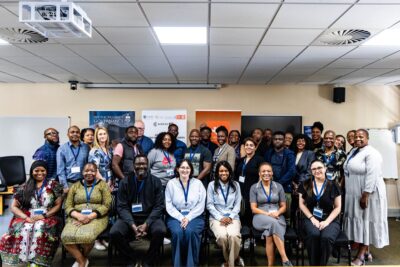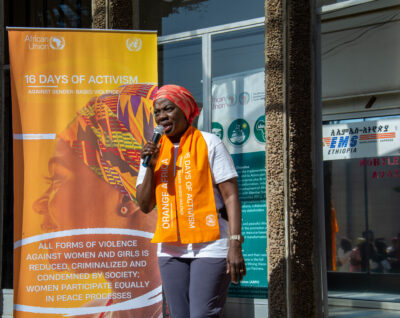The children at London’s Riverside Primary School were lining up to go into the final assembly of the school year, which the Year 6 children (aged 10–11) had prepared to mark their leaving primary school. The children in other year groups sat on the floor, while parents and other adults I recognized from my ethnographic fieldwork with Riverside Church were sitting on chairs at the back of the hall. The O’Jays’ “Love Train” was playing over the stereo, and the atmosphere was celebratory as some of the children sang along to the music while they sat ready to watch the assembly. The room was decorated with brightly colored posters the children had made depicting London and the different parts of the world they or their families had come from.
The Year 6 children and their teacher had decided that their assembly would focus on the children talking about their preparations for their “prom”—the party the school was organizing to mark their leaving the school, borrowing from the US idea of a high school prom. The assembly opened with the children standing in the four corners of the hall, performing staged conversations about their plans for their “prom,” speaking about how they were going to “represent everyone and everyone’s backgrounds in the prom.” “But no soul music,” one of them said. “It’s not the 1970s!”
The children spoke about their different cultural backgrounds, discussing their families’ different food, music, and dancing they could include in the prom. Children wearing t-shirts with Jamaican flags, for example, drummed on steel drums while other children performed a dance to this, while other children danced and sang songs in languages other than English, from countries including Somalia, Poland, Albania, Italy, Cambodia, Ethiopia, India, and China. At the end of the assembly, all the children came together in the middle of the hall and talked about how their prom would include things “from each of our cultures, and it will be the best graduation prom ever.” They then danced and sang along again to “Love Train.” Visibly moved by the assembly, the head teacher, Lou, thanked the children for their assembly and the pictures they had made for the hall, saying, “You’ve made a utopian vision of a society where everyone can come together and learn from each other.”
As the children and adults left the assembly, shimmying along to “Love Train,” I felt uplifted, yet also a sense of sadness. As I wrote up my field notes later, I tried to reflect on my emotion. Was it bound up with this marking of the children’s leaving primary school? The fact that in watching children move on to new things and toward adulthood we see time pass so visibly, glimpsing our own now-passed childhoods and the horizon of the possible futures toward which these children are moving? Or was it to do with the moral vision these children expressed? The ethics of pluralism they enacted, and the uncertain political future of these children’s lives?
As the past decade of ongoing economic crisis and more recent political events such as Brexit and Donald Trump’s ascent to power have induced feelings of anxiety, shock, and horror for many, it is easy to understand a shift to a catastrophic structure of feeling, which, as John Urry notes, has shaped a large body of work in the social sciences sounding apocalyptic notes about the potential collapse of human societies. However, perhaps the current time calls, as Naomi Klein argues in No Is Not Enough, for forms of “utopian dreaming”—not only seeking to understand a world we do not want but trying to map the one we want instead.
In heeding this call, one task for scholars of religion is to attend not only to themes of conflict and the demarcation of boundaries between groups in religiously pluralist settings, but also to explore the ways in which utopian imaginings of ethical life are enacted in the everyday, for example, the ways in which in ordinary interactions, relationships across forms of religious difference work well and offer a vision of ethical coexistence.
In The Claim of Reason, the philosopher Stanley Cavell describes romanticism as “the discovery that the everyday is an exceptional achievement. Call it the achievement of the human.” For Cavell, the achievement of the everyday is also bound up with a tragic sensibility as we acknowledge our finitude and limitedness. He discusses how the play King Lear teaches us this moment of acknowledgement, when our eyes are opened to “the knowledge that this is the best—the occurrence of this tree, of that stone, at that distance, in this light, myself undrugged and unhampered, in the best of health.”
Perhaps, looking back, my simultaneous happiness and sadness was bound up with this sense that this is the best. The ways in which we can see time pass so visibly in children’s lives—as symbolized in that end of school assembly—perhaps heightened my consciousness of the joyfulness of these children dancing and singing to this music, in this space, their shared excitement about this prom, the specific relationships they had created through their time in this school, and the passing of this moment.
This sense that the everyday is an exceptional achievement is also, for Cavell, bound up with an acknowledgement that this is an achievement still to be attained. The utopian ideals of community that romanticism celebrated, for example, were, as Simon Critchley notes in “Cavell’s ‘Romanticism’ and Cavell’s Romanticism,” never fully achieved. As Cavell puts it, “romantics dream revolution, and break their hearts.” Yet Cavell argues that such utopian moments—“an imagination of justice”—are vital in motivating forms of ethical life. Forms of utopian thinking will perhaps always be inevitably tragic, as visions of peaceful coexistence and love will always be at odds with the violence, injustices, and exclusions of lived social and political contexts, and they therefore encourage a sense of disappointment. Yet utopian imaginings of the world we want can also provide forms of hope and moral motivation and are especially important at this present time.
Utopian imaginings were frequently expressed by members of Riverside Church, an open evangelical congregation that was linked with Riverside Primary School. Church members spoke about their main aspiration for Riverside in terms of helping to enable the local community to flourish. In a sermon one Sunday evening, Andy, the church’s senior minister, said that his vision for church involvement in the local community was about “360-degree life—economic, spiritual, social, political.” He then read a section of chapter 21 of the book of Revelation, describing the vision of a new Jerusalem, and the idea of the dwelling of God being with men, and God wiping away every tear. He asked, “If that’s what the future looks like, how do we work to make that happen now?” His next slide had some mocked-up visuals of imaginary news stories, for example, a BBC news story describing their local area as “the best place to live in the UK,” with an image of a group of smiling children in school uniforms in a circular embrace.
He then read through a poem written for anniversary celebrations of the church’s founding, drawing on this Revelation passage but in language celebrating a particular sense of urban diversity. It began:
I saw children paddling in the River Thames.
I saw a football match in the
park and the teams were mixed people
from every people group: asylum seekers
And taxi drivers, policemen and
prisoners, pensioners and politicians.
People from every race and class playing and
laughing in the sun.
After reading the poem, he asked the congregation to reflect on what Riverside had achieved, listing the tons of food they had collected for their food bank, the children from the local area who came to the holiday clubs they run, the mentoring schemes they had set up for local young people who end up repeatedly in A&E. And members of Riverside were very actively involved in these and other forms of social action, in ways resonating with Ernst Bloch’s description of hope as requiring “people who throw themselves into what is becoming, to which they themselves belong.”
The Kingdom of God that many evangelicals seek to become oriented toward, as I have discussed in my research with a conservative evangelical congregation in London, is an eschatological kingdom beyond place, which shapes their engagement with the city around them in terms of trying to maintain a conversionist missionary logic. The vision of a heavenly city at Riverside, in contrast, is one that motivates its members to strive to realize this within the immanent frame. Like the adults, the children at Riverside Church also expressed a sense of the Kingdom of God as both already enacted in the everyday and as a utopian ideal to be realized. One Sunday morning, the children were asked by Gemma, the group’s leader, what they thought the Kingdom of God was like and to draw their ideas. One boy in the group, Malachi, drew a picture of two people, and when I asked him what this was, he replied, “Two people helping each other.” Natalie, a girl in the group, said that her image was of people “being kind to each other.” Their understanding of everyday acts of kindness as the Kingdom of God might perhaps be seen as a way of finding modes of transcendence and wonder in everyday, immanent life, rather than locating transcendence in some other-worldly realm.
Attending to the everyday as an achievement, and to the concrete ways in which particular utopian moments are imagined, articulated, and accomplished in the everyday, can give us insight into the ways in which people live their lives well together beyond approaches to religion that highlight difference or attempt to manage forms of diversity through top-down solutions, as Lori Beaman highlights in her work on deep equality. When I described what “sociological” meant to one of the children at Riverside in terms of understanding how societies work, he said, “Do you mean it’s about helping people to get on better?” Our work should be about helping people to get on better, and one part of this work is about exploring the spaces and places in which people already live well together.
While it is tempting—and justifiable—to feel disappointment, despair, or horror at many political events unfolding around us in the contemporary moment, attending to the ways in which ordinary ethical interactions can be seen as “exceptional achievements” can provide grounds for hope and resources for thinking about the world we want. Cavell’s provocation that “this is the best” invites us to acknowledge both our senses of lack and the limitation of present conditions, and the sense that this is all there is (and that this is the best). As he writes in Cities of Words: “You can at once want the world and want it to change.”














